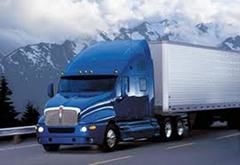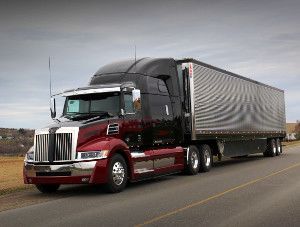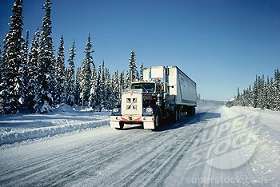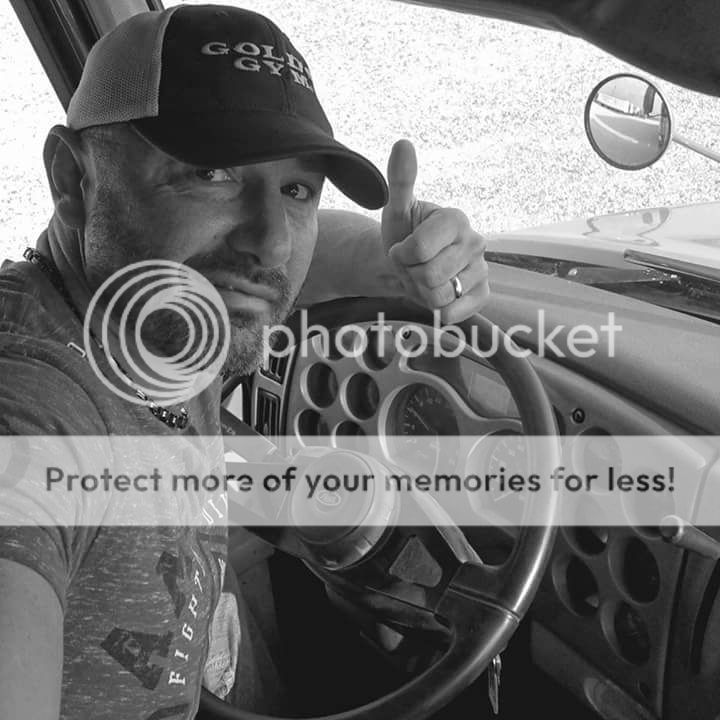Trucker's Supplies For The Road?
Topic 10551 | Page 1

Toilet paper, baby wipes, and disinfectant wipes. Your toilet paper roll in a small Folgers can will be very safe, and pretty waterproof for those crucial moments. Baby wipes help out if a shower wasn't gonna happen that day. The disinfectant wipes are nice to general cleanliness in the truck, and for dirty restrooms when nature isn't gonna quit.
Clipboard and a porta-file make life easier.
A couple of small-ish storage tubs are very handy for your stuff.
At least a half-package of printer paper is good to have when using Transflo systems, also scotch tape. You have to tape receipts to the page to make it scan to your company.
Keep about a full pack of pens. They will disappear over time, like lighters. Also, lighter. Even if you don't smoke, it will become handy.
Consider a RoadPro lunchbox heater for a hot meal to save you money because canned food is cheap at Walmart. Also because even a crap day becomes better with hot food in you.
I also buy big packs of those plastic laundry soap pods for laundry day because no risk of spillage and no need to measure anything.
Have a towel or two, because not every truck shower has enough towels.
A seatback organizer will save you lots of time and space for storing your maps, pens, reg books and random needed items; I got mine on Amazon for $15 and it is a staple for me.
Anything that helps keep your glass and mirrors clean should be a staple also.
Anything that can keep food cold is good too, because sandwiches are fast, cheap, and easy to make.
Bedding: Don't skimp here. Treat yourself the best you can with nice sheets, warm blanket and the best pillow that you can manage, because caffeine is overrated when you're activating your brain's executive function for up to 14 hours a day. NOTHING ever does a person better than good solid sleep, and if it is the kind where you wake up with drool on your face then you've slept well.
Sturdy work gloves, with leather palms. I had a collapsible push broom when I pulled a dry van , and I swept a LOT of trailers to get loaded.
Commercial tire gauge because you need to be sure that your tires are ready to go.
I personally like map markers to mark parking locations that are not in the truck stop guide or the apps, such as roadside pullouts or otherwise unknown safe parking areas.
I also have two of the 2 gallon refillable jugs from WalMart and a couple 1 gallon water jugs, so 6-7 gallons total on board because your A/C & heater will dry you out and I can easily take in a gallon of water a day. Dehydration will impair you.
Safety glasses & hardhat. Usually issued, but always best to have.
Keep basic medical supplies: band-aids, gauze, Neosporin-type cream, and of course whatever works for your headaches if you get one.
I also keep a small trash can with liners because it helps more than putting a bag on the passenger seatbelt buckle.
I also prefer to use a power inverter that has USB ports on it to power things.
I'm sure more things will come along, but these are the basics that I run with and I never seem to need anything else aside from this list.
SAP:
Substance Abuse Professional
The Substance Abuse Professional (SAP) is a person who evaluates employees who have violated a DOT drug and alcohol program regulation and makes recommendations concerning education, treatment, follow-up testing, and aftercare.
Dry Van:
A trailer or truck that that requires no special attention, such as refrigeration, that hauls regular palletted, boxed, or floor-loaded freight. The most common type of trailer in trucking.DAC:
Drive-A-Check Report
A truck drivers DAC report will contain detailed information about their job history of the last 10 years as a CDL driver (as required by the DOT).
It may also contain your criminal history, drug test results, DOT infractions and accident history. The program is strictly voluntary from a company standpoint, but most of the medium-to-large carriers will participate.
Most trucking companies use DAC reports as part of their hiring and background check process. It is extremely important that drivers verify that the information contained in it is correct, and have it fixed if it's not.
HOS:
Hours Of Service
HOS refers to the logbook hours of service regulations.DWI:
Driving While Intoxicated
Fingernail clippers (though ladies usually have them in their makeup kit.) A plastic plate & bowl. I have a larger (1-1/2 qt) bowl for a "mini-sink".
Get some white plastic organizer baskets, about 6-8" long. Many small things will find their way there. I carried a box of freezer bags (heavier plastic) for things.
A stapler to keep papers together. Both wet & dry erase markers. (for map book and writing quick notes on the window)
Duct tape.
I use a pair of jersey gloves with plastic on the palm side just for fuel time. Leather palm jersey back work gloves (cheaper, last longer, more comfortable than "leather gloves") for trailer work.
Find a Harbor Freight Tools store near you. It's like a Walmart for tools.
List Of Items To Take To CDL School, On-the-road Training, and Solo DrivingCDL:
Commercial Driver's License (CDL)
A CDL is required to drive any of the following vehicles:
- Any combination of vehicles with a gross combined weight rating (GCWR) of 26,001 or more pounds, providing the gross vehicle weight rating (GVWR) of the vehicle being towed is in excess of 10,000 pounds.
- Any single vehicle with a GVWR of 26,001 or more pounds, or any such vehicle towing another not in excess of 10,000 pounds.
- Any vehicle, regardless of size, designed to transport 16 or more persons, including the driver.
- Any vehicle required by federal regulations to be placarded while transporting hazardous materials.
OTR:
Over The Road
OTR driving normally means you'll be hauling freight to various customers throughout your company's hauling region. It often entails being gone from home for two to three weeks at a time.

Vice grips are a must!! I say that because I seemed to get all the freak accidents back in 2001. I fueled my truck was waiting for my running buddy to finish up so we could make our way to Wisconsin. She tried jumping my truck, everything we could think off. So she left and the fuel attendant gave me a number to call. I had a ground wire break in half under the cab area and had enough slack to shave the coating off the frame, lay the frayed end on it and put a death grip on it when using the vice grips to make sure it wouldn't come off in Chicago traffic.

I find it handy to have some good tough hand wipes that remove grease and grime, handi wipes, shop towels or rags, a flashlight, a rain jacket and pants, assorted tools and zip ties and wire, a few bungee cords the heavy duty black rubber ones, and depending on what and where you end up, a hard hat, high visibility safety vest, steel or safety toe boots, boots with oil resistant soles, comfortable driving shoes like tennis shoes, TP, paper towels, window cleaner, cellphone battery or backup charger, tire thumper, tire gauge, a couple screwdrivers, adjustable wrench, channel locks, and some PB-Blaster along with various assorted over the counter medications. Always carry drinking water like 2 gallons for emergencies and if you're like me and like good coffee, a small stove and dripper with filters and coffee, a thermos, and etc.
Phil

Windex, a spare toothbrush, a truck stop pocket guide in case you don't have a smartphone, a claw hammer (is great for prying), some old t-shirts or shop rags, etc.
Everyone has things that they find the most useful. For me, I'd rather use a claw hammer over a tire checker as they both serve the same purpose. If you don't want to pay 5 bucks for shop rags, go to Walmart and get the 18 pack of hand towels. Same price for a way bigger quantity, and they're also a lot more absorbent. Consider a clipboard case for your paperwork, they are a lot more reliable then storing everything in a folder. Some drivers will get the biggest cup they can find and fill it with free ice to throw in a cooler, as opposed to buying one with a built-in refrigeration unit. This is much cheaper and more reliable than relying on something that relies on the battery. Get yourself a hand broom and dustpan as well. It's not a good look for a truck to be covered in dust and dirt, so I sweet mine out every 2 or 3 days. Dawn dish soap or any other dish detergent works great on bugs.
Side cut pliers for cutting load seals on the door, a pair of voice grips for when the release arm on the trailer tandems won't stay in place, small ratchet strap for the same reason and a small crowbar. A good set of boots, winter hat, coat and things to keep you warm in case you break down during the winter.
Tandems:
Tandem Axles
A set of axles spaced close together, legally defined as more than 40 and less than 96 inches apart by the USDOT. Drivers tend to refer to the tandem axles on their trailer as just "tandems". You might hear a driver say, "I'm 400 pounds overweight on my tandems", referring to his trailer tandems, not his tractor tandems. Tractor tandems are generally just referred to as "drives" which is short for "drive axles".
Tandem:
Tandem Axles
A set of axles spaced close together, legally defined as more than 40 and less than 96 inches apart by the USDOT. Drivers tend to refer to the tandem axles on their trailer as just "tandems". You might hear a driver say, "I'm 400 pounds overweight on my tandems", referring to his trailer tandems, not his tractor tandems. Tractor tandems are generally just referred to as "drives" which is short for "drive axles".

A small multi piece tool kit you can get at harbor freight tools pretty cheap winter gloves
Most of the big companies use an e-log system and it'll have a gps system built in but it's good to have your own as well. I personally like the Rand McNally gps and make sure you have a Rand McNally Motor Carriers Road Atlas. Small tool box can hold things like the pliers, tire gauge, screw drivers, crescent wrench, box wrenches (7/16, 9/16, 1/2, 5/8) will cover most stuff you'd do & tape (duct & electrical), tape measure.....I use a spiral notebook to write down my load information & plan on starting an address book with my drop locations info (name/address/what time they'll actually unload & who unloads)...I'm sure I've forgotten something...Good luck

I've been solo OTR for a month now and it seems I find one or two things everyday that I could use. You sound like you like things organized and in it's place, I'm that way also. I'd recommend all the aforementioned especially vice grips for tandem pin release handle when it's stuck and won't pull out all the way. I'd suggest a binber/organizer folder for your bills and paperwork labeled Monday thru Sunday. You'd surprised how hard it is to remember what date, location, and load went where and in what order just several days earlier when you're a rookie, so much swirling around in your head to begin with I guess. I use chalk to mark the holes I'm wanting to put the tandem pins in, a good 4 or 5lb hammer, air freshener, a gym bag or back pack, some good bungee straps, and a suction cup mount for your cell phone, oh and a BT headset. I'll have 10 more for at the end of next week lol! Good luck!!!
OTR:
Over The Road
OTR driving normally means you'll be hauling freight to various customers throughout your company's hauling region. It often entails being gone from home for two to three weeks at a time.
Tandem:
Tandem Axles
A set of axles spaced close together, legally defined as more than 40 and less than 96 inches apart by the USDOT. Drivers tend to refer to the tandem axles on their trailer as just "tandems". You might hear a driver say, "I'm 400 pounds overweight on my tandems", referring to his trailer tandems, not his tractor tandems. Tractor tandems are generally just referred to as "drives" which is short for "drive axles".
Fingernail clippers (though ladies usually have them in their makeup kit.) A plastic plate & bowl. I have a larger (1-1/2 qt) bowl for a "mini-sink".
Get some white plastic organizer baskets, about 6-8" long. Many small things will find their way there. I carried a box of freezer bags (heavier plastic) for things.
A stapler to keep papers together. Both wet & dry erase markers. (for map book and writing quick notes on the window)
Duct tape.
I use a pair of jersey gloves with plastic on the palm side just for fuel time. Leather palm jersey back work gloves (cheaper, last longer, more comfortable than "leather gloves") for trailer work.
Find a Harbor Freight Tools store near you. It's like a Walmart for tools.
List Of Items To Take To CDL School, On-the-road Training, and Solo DrivingCDL:
Commercial Driver's License (CDL)
A CDL is required to drive any of the following vehicles:
- Any combination of vehicles with a gross combined weight rating (GCWR) of 26,001 or more pounds, providing the gross vehicle weight rating (GVWR) of the vehicle being towed is in excess of 10,000 pounds.
- Any single vehicle with a GVWR of 26,001 or more pounds, or any such vehicle towing another not in excess of 10,000 pounds.
- Any vehicle, regardless of size, designed to transport 16 or more persons, including the driver.
- Any vehicle required by federal regulations to be placarded while transporting hazardous materials.
OTR:
Over The Road
OTR driving normally means you'll be hauling freight to various customers throughout your company's hauling region. It often entails being gone from home for two to three weeks at a time.

You sound like a mirror image of myself... I'm planning way ahead to start in the spring time (around march myself) for the exact same reason. I don't want to have to figure out how to drive a truck in the snow / ice conditions when I can barely drive the truck in dry warm conditions. I figure if I wait until March most of the winter weather will be gone... although lately I have seen snow / ice in the northern states in June.

These are all awesome suggestions, thanks! I appreciate the input. I'm making my list now and will continue to add to it as more suggestions come in. (As for living on the road, I used to tour with bands on a tour bus, so I'm pretty set on what daily living needs I'll need.)
Tangentially, how much will I need to know about the actual mechanics of the truck? I'm sure some basics will be covered in training (at least I hope so) but if there is something completely amiss I won't be able to do much, no matter how many tools I have. Heck, I can't even drive a manual transmission (yet) so the idea of having to possibly work on the truck seems daunting, but if that's what it takes to do the job I'll learn what I need to.
So is this an issue I need to add to my "worry" list?
New Reply:
New! Check out our help videos for a better understanding of our forum features

















Preview:
This topic has the following tags:
First Solo Months On The Road Items To Bring On The Road Items To Bring To CDL School On The Road In Training Truck Equipment







 TT On Facebook
TT On Facebook
Hi everyone. I've been poking around the site for a while, and I want to say how awesome it is and how helpful everyone seems to be. The resources are amazing, and the attitudes are stellar. I appreciate what this forum does and hope it operates.
I'm planning on going to CDL company training in the spring, because I'm one of those annoying people that pre-plans everything ahead of time down to the minute. I'm wanting to study as much as I can all the CDL materials on here, as well as the High Road information, so that when I get to classes it will be like a review. I also want to try to get into better shape to make sure I can pass the physical tests. And finally, I figured getting some driving time under my belt during better weather would be helpful before trying to drive in possible snowy and/or icy conditions. (One thing at a time, right?)
In my planning and preparation, I've been trying to guess at what kinds of things I'll need when I'm on the road as it pertains to the job itself. The obvious things are work gloves, flashlight/headlight, and possibly a multitool. Is there anything else that you've had to provide yourself that you found was a lifesaver (figuratively speaking) when out on the road? Should I investigate bringing any types of tools? Are GPS/navigation systems supplied by most trucking companies? Do roadside assistance kits for big rigs exist?
I'm going to post 2 more posts about other questions I have, but since they are distinct topics I didn't want the thread to be confusing by asking a million questions about random things.
Thanks!
CDL:
Commercial Driver's License (CDL)
A CDL is required to drive any of the following vehicles:
HOS:
Hours Of Service
HOS refers to the logbook hours of service regulations.